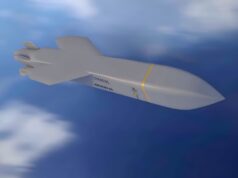The Ministry of Defence is looking to explore how the ‘Internet of Things’ and ‘Systems on a chip’ can improve missile defence capabilities via a £77k contract.
According to a contract nice published today, the ai fo the work is as follows.
“To understand the potential benefits of System on Chip technology and the Internet of Things to develop a range of new concepts for the application of this technology within missile defence.”
The notice also explains what work will be done at this stage:
“The study will involve three work packages (WPs) aimed at developing an understanding of the problem space, identifying potential applications, and generating system architectures and technology roadmaps for the future implementation of selected concepts.
WP1 – Literature Review
WP2 – Concept Generation
WP3 – Concept Development”
What is the ‘Internet of Things’?
According to IoTAgenda here, the internet of things, or IoT, is a system of interrelated computing devices, mechanical and digital machines, objects, animals or people that are provided with unique identifiers and the ability to transfer data over a network without requiring human-to-human or human-to-computer interaction.
“A thing in the internet of things can be a person with a heart monitor implant, a farm animal with a biochip transponder, an automobile that has built-in sensors to alert the driver when tire pressure is low or any other natural or man-made object that can be assigned an Internet Protocol (IP) address and is able to transfer data over a network.”
What is ‘System on a chip’?
According to Tom’s Hardware.
“This is a chip/integrated circuit that holds many components of a computer—usually the CPU (via a microprocessor or microcontroller), memory, input/output (I/O) ports and secondary storage—on a single substrate, such as silicon. Having all of these components on one substrate means SoCs use less power and take up less space than their multi-chip counterparts.
SoCs are becoming increasingly popular with the growth of Internet of Things and edge and mobile computing. Take, for example, Intel’s September 2018 acquisition of SoC firm Silicon Engineering Group and older acquisitions of Altera and others.”
A good example of a SoC is the popular Raspberry Pi.














Automated countermeasures.
It is also about using very very large surfaces to increase sensitivity and make jamming harder.
Very interesting!
I remember all the hype about foreign nations being able to build supercomputers out of PS3’s (some uni’s did do that and it worked quite well for a cheap supercomputer) so what would be the problem with using Xbox Series X now for military purposes as it’s hugely powerful.
I’m assuming it could be modified to be secure and would be super cheap.
Actually Xbox isn’t that powerful, it seems more powerful than it actually is because it specialises in one main thing delivering game performance. Apple’s new top end Arm chips* already out perform it and will no doubt thoroughly embarrass their performance next year, but they aren’t designed around inefficiently extending game performance. It’s however why Microsoft itself (and others) is developing its own Arm based chips while others including interesting developments jointly by IBM and Samsung are promising a very powerful 3D take on SoC design to improve performance and efficiency.
*of course interestingly the original design of those chips were used in US ballistic missiles.
ARM in ballistic missiles?
Which ballistic missiles?
If you’re talking ICBMs, all of America’s are decades older than ARM, which was created in 1985.
ICBMs are 60’s technology, pre integrated circuits.
Not even a precursor, it was something like 50 kilos of discrete transistors.
ARM chips were developed by a Acorn Computers in Cambridge back in the late 1980’s, the acronym coming from Acorn RISC Machine. This would later be spun out into what is now ARM holdings. The primary advantage of the chip is its Reduced Instruction Set Computer (RISC) design, compared to traditional Complex Instruction Set Computer (CISC) chips such as Intels.
ARM designs appear in virtually every smartphone and all of Apple’s computers. ARM designs are also increasingly being used in server farms for cloud providers, for example Amazon’s own Graviton chip.
Quite frankly, it’s amazing if the MoD is only now looking at utilising this 🤷â€â™‚ï¸
Its quite possible the MoD had a few BBC micros back in the 80s so perhaps not the first time they utilised ARM tech 🙂 . But seriously there’s so many comments on this site about protectiing metal bashing industries but the reality without technology like microchips you may as well go to war in tin can.
Agreed. The USA has identified chip fab as a strategic resource with it being essential to equip most things bigger than a bullet these days.
The next major conflict could be decided simply by which side runs out of either ammunition or chips first.
IOT is really scary for this – I certainly think missile defence needs to be a fully closed system.
I really do wish people would think about things before using the latest industry buzz words…
It would almost certainly be operating on a closed network. Internet of Things just means devices that can talk to each other. In the consumer world that’s over the public internet, but it doesn’t have to be.
Maybe I’m misunderstanding it, but it sounds more like increasing the capability of missiles to communicate with each other and the controlling radar/system rather than giving Meteor the ability to find your lost cows.
Hi Ryan
and that’s the problem – the IOT uses the internet by definition – it is not a closed system no matter what anyone tells you.
you can do the same over a closed military network. there is already widespread hacking of IOT devices it simply is not secure enough for anything to do with something that can kill people.
So terminology is important and my view IOT is good for ordering milk when it runs out – not good for missiles in any way shape or form.
THE internet or A internet? If the former then yeah, I can see why you might be worried. The latter, as Talon noted in the other reply to you, wouldn’t be so. I can’t imagine those making such decisions would put this stuff on the same open net that we’re using right now.
Now your missile will tell you when you need to order some more milk….
How can the military work without milk for tea or coffee?
It’d be complete anarchy.
Chap’s complete shower!
Mmmmmmm a little above my knowledge and pay grade….hold on, let me go and clear those trenches and buildings!